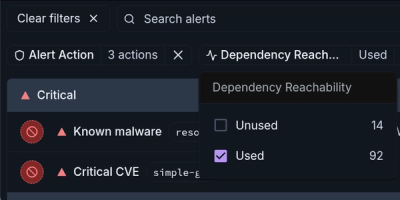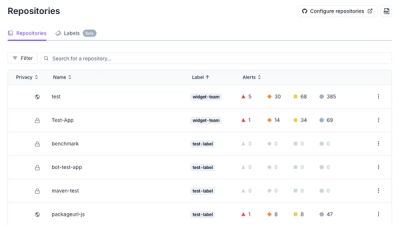
Product
Introducing Module Reachability: Focus on the Vulnerabilities That Matter
Module Reachability filters out unreachable CVEs so you can focus on vulnerabilities that actually matter to your application.
elasticsearch-tools
Advanced tools
A collection of elasticsearch command line tools for doing things like bulk importing/exporting and exporting/importing mappings.
It was created because some of the existing import/export tools ran too slow on my machine. Using the new bulk API seemed to speed things up dramatically. The other tools I used also weren't exporting _parent and _routing fields.
npm install -g elasticsearch-tools
After installing, you will have access to the following command line tools:
es-export-bulk --help
Usage: es-export-bulk [options]
Options:
-h, --help output usage information
-v, --version output the version number
-u, --url <url> the elasticsearch url to connect to
-f, --file <file> the file to write data to
-m, --max <number> the maximum number of items to export. different than the scroll size
--transformMeta <js> a javascript function that returns an object that is the transformed meta object
--transformSource <js> a javascript function that returns an object that is the transformed source object
--transformMetaInit <js> a javascript function that returns an init object that contains helpers for the transform function
--transformSourceInit <js> a javascript function that returns an init object that contains helpers for the transform function
--index <index> ES OPTION: a comma-separated list of index names to search; use _all or empty string to perform the operation on all indices
--type <type> ES OPTION: a comma-separated list of document types to search; leave empty to perform the operation on all types
--body <body> ES OPTION: the body to send along with this request.
--analyzer <analyzer> ES OPTION: The analyzer to use for the query string
--analyzeWildcard <analyzeWildcard> ES OPTION: specify whether wildcard and prefix queries should be analyzed (default: false)
--fields <fields> ES OPTION: a comma-separated list of fields to return as part of a hit (default: "*")
--from <from> ES OPTION: starting offset (default: 0)
--q <q> ES OPTION: query in the Lucene query string syntax
--routing <routing> ES OPTION: a comma-separated list of specific routing values
--scroll <scroll> ES OPTION: specify how long a consistent view of the index should be maintained for scrolled search (default: 1m)
--size <size> ES OPTION: number of hits to return during each scan
--sort <sort> ES OPTION: a comma-separated list of <field>:<direction> pairs
--timeout <timeout> ES OPTION: explicit operation timeout
es-export-bulk --url http://localhost:9200 --file ~/backups/elasticsearch/prod/data.json --body '
{"query":{"range":{"timestamp":{"gte":"2014-08-13T11:00:00.000Z","lte":"2014-08-13T12:00:00.000Z"}}}}
'
es-export-bulk --url http://localhost:9200 --file ~/backups/elasticsearch/prod/data.json --index myIndex
es-export-bulk --url http://localhost:9200 --file ~/backups/elasticsearch/prod/data.json --transformSource 'data.foo = "neat"'
# the return statement is optional
es-export-bulk --url http://localhost:9200 --file ~/backups/elasticsearch/prod/data.json --transformSource 'data.foo = "neat";return data;'
es-export-bulk --url http://localhost:9200 --file ~/backups/elasticsearch/prod/data.json --transformSource 'delete data.foo'
es-export-bulk --url http://localhost:9200 --file ~/backups/elasticsearch/prod/data.json --transformMeta 'delete data.index._parent'
es-export-bulk --url http://localhost:9200 --file ~/backups/elasticsearch/prod/data.json --transformMeta 'data.index._index = "newIndex"'
es-export-mappings --help
Usage: es-export-mappings [options]
Options:
-h, --help output usage information
-v, --version output the version number
-u, --url <url> the elasticsearch url to connect to
-f, --file <file> the file to write data to
--index <index> ES OPTION: String, String[], Boolean — A comma-separated list of index names
--type <type> ES OPTION: String, String[], Boolean — A comma-separated list of document types
--ignoreUnavailable <ignoreUnavailable> ES OPTION: Boolean — Whether specified concrete indices should be ignored when unavailable (missing or closed)
--allowNoIndices <allowNoIndices> ES OPTION: Boolean — Whether to ignore if a wildcard indices expression resolves into no concrete indices. (This includes _all string or when no indices have been specified)
--expandWildcards <expandWildcards> ES OPTION: String — Whether to expand wildcard expression to concrete indices that are open, closed or both.
--local <local> ES OPTION: Boolean — Return local information, do not retrieve the state from master node (default: false)
es-export-mappings --url http://localhost:9200 --file ~/backups/elasticsearch/prod/prod.mappings.json
es-export-settings --help
Usage: es-export-settings [options]
Options:
-h, --help output usage information
-v, --version output the version number
-u, --url <url> the elasticsearch url to connect to
-f, --file <file> the file to write data to
--index <index> ES OPTION: String, String[], Boolean — A comma-separated list of index names
--ignoreUnavailable <ignoreUnavailable> ES OPTION: Boolean — Whether specified concrete indices should be ignored when unavailable (missing or closed)
--allowNoIndices <allowNoIndices> ES OPTION: Boolean — Whether to ignore if a wildcard indices expression resolves into no concrete indices. (This includes _all string or when no indices have been specified)
--expandWildcards <expandWildcards> ES OPTION: String — Whether to expand wildcard expression to concrete indices that are open, closed or both.
--local <local> ES OPTION: Boolean — Return local information, do not retrieve the state from master node (default: false)
--name <name> ES OPTION: String, String[], Boolean — The name of the settings that should be included
es-export-settings --url http://localhost:9200 --file ~/backups/elasticsearch/prod/prod.settings.json
es-export-aliases --help
Usage: es-export-aliases [options]
Options:
-h, --help output usage information
-v, --version output the version number
-u, --url <url> the elasticsearch url to connect to
-f, --file <file> the file to write data to
--index <index> ES OPTION: String, String[], Boolean — A comma-separated list of index names
--local <local> ES OPTION: Boolean — Return local information, do not retrieve the state from master node (default: false)
--name <name> ES OPTION: String, String[], Boolean — The name of the settings that should be included
es-export-aliases --url http://localhost:9200 --file ~/backups/elasticsearch/prod/prod.aliases.json
es-import-bulk --help
Usage: es-import-bulk [options]
Options:
-h, --help output usage information
-v, --version output the version number
-u, --url <url> the elasticsearch url to connect to
-f, --file <file> the file to read data from
-m, --max <items> the max number of lines to process per batch
es-import-bulk --url http://localhost:9200 --file ~/backups/elasticsearch/prod/rafflev1.json
es-import-mappings --help
Usage: es-import-mappings [options]
Options:
-h, --help output usage information
-v, --version output the version number
-u, --url <url> the elasticsearch url to connect to
-f, --file <file> the file to read data from
--ignoreConflicts <ignoreConflicts> ES OPTION: Boolean — Specify whether to ignore conflicts while updating the mapping (default: false)
--timeout <timeout> ES OPTION: Date, Number — Explicit operation timeout
--masterTimeout <masterTimeout> ES OPTION: Date, Number — Specify timeout for connection to master
--ignoreUnavailable <ignoreUnavailable> ES OPTION: Boolean — Whether specified concrete indices should be ignored when unavailable (missing or closed)
--allowNoIndices <allowNoIndices> ES OPTION: Boolean — Whether to ignore if a wildcard indices expression resolves into no concrete indices. (This includes _all string or when no indices have been specified)
--expandWildcards <expandWildcards> ES OPTION: String — Whether to expand wildcard expression to concrete indices that are open, closed or both.
es-import-mappings --url http://localhost:9200 --file ~/backups/elasticsearch/prod/prod.mappings.json
es-import-settings --help
Usage: es-import-settings [options]
Options:
-h, --help output usage information
-v, --version output the version number
-u, --url <url> the elasticsearch url to connect to
-f, --file <file> the file to read data from
--masterTimeout <masterTimeout> ES OPTION: Date, Number — Specify timeout for connection to master
--ignoreUnavailable <ignoreUnavailable> ES OPTION: Boolean — Whether specified concrete indices should be ignored when unavailable (missing or closed)
--allowNoIndices <allowNoIndices> ES OPTION: Boolean — Whether to ignore if a wildcard indices expression resolves into no concrete indices. (This includes _all string or when no indices have been specified)
--expandWildcards <expandWildcards> ES OPTION: String — Whether to expand wildcard expression to concrete indices that are open, closed or both.
es-import-settings --url http://localhost:9200 --file ~/backups/elasticsearch/prod/prod.settings.json
es-import-aliases --help
Usage: es-import-aliases [options]
Options:
-h, --help output usage information
-v, --version output the version number
-u, --url <url> the elasticsearch url to connect to
-f, --file <file> the file to read data from
--timeout <timeout> ES OPTION: Date, Number — Explicit operation timeout
--masterTimeout <masterTimeout> ES OPTION: Date, Number — Specify timeout for connection to master
es-import-aliases --url http://localhost:9200 --file ~/backups/elasticsearch/prod/prod.aliases.json
Copyright (c) 2014 skratchdot
Licensed under the MIT license.
FAQs
Elasticsearch command line tools for importing, exporting, etc
The npm package elasticsearch-tools receives a total of 68 weekly downloads. As such, elasticsearch-tools popularity was classified as not popular.
We found that elasticsearch-tools demonstrated a not healthy version release cadence and project activity because the last version was released a year ago. It has 1 open source maintainer collaborating on the project.
Did you know?

Socket for GitHub automatically highlights issues in each pull request and monitors the health of all your open source dependencies. Discover the contents of your packages and block harmful activity before you install or update your dependencies.

Product
Module Reachability filters out unreachable CVEs so you can focus on vulnerabilities that actually matter to your application.

Company News
Socket is bringing best-in-class reachability analysis into the platform — cutting false positives, accelerating triage, and cementing our place as the leader in software supply chain security.

Product
Socket is introducing a new way to organize repositories and apply repository-specific security policies.